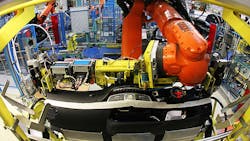Kuka AG, the German robot maker acquired last year by Midea Group Co. of China, needs to lower costs and win government recognition as a local brand to achieve its goal of becoming the No. 1 supplier in the Chinese market, according to an executive.
“Kuka has a reputation for reliability, but as you know, as a German company, they are not really well-known for low-cost products,” Midea vice president Andy Gu said in an interview Wednesday in Shanghai. “We need to really work very hard to figure out how we can really reduce these costs.” In the meantime, Japanese competitors “are very aggressive in terms of grabbing market share,” he said.
Midea spent about 3.7 billion euros ($3.92 billion) last year taking over Kuka through a cash offer that faced both political opposition in Germany and scrutiny by the American government. The deal gave China’s top appliance maker control over one of the world’s leading industrial robotics companies just as the country embarks on an ambitious plan to automate its vast manufacturing sector. Demand is being spurred by rising labor costs, making China the biggest robot market in the world.
Capturing the top spot in China is a “clear goal,” Kuka CEO Till Reuter said in a separate interview, adding that the company is currently among the three biggest suppliers in the country with a 14% share, and aims to double annual sales over the next two years to 10,000 units.
The executives offered no details on how Kuka plans to lower costs as it strives to compete with Fanuc Corp. and Yaskawa Electric Corp. of Japan, as well as Switzerland’s ABB Ltd. Combined, the four companies make almost all of the robots working inside global factories. Ahead of the takeover, Guangdong-based Midea agreed to protect jobs and plants in Germany until the end of 2023 and not to pursue a domination agreement or delisting of the company’s shares.
Midea shares have gained 48% since it made the cash offer for Kuka on June 16, compared with the about 11% gain in the Shanghai Shenzhen CSI 300 Index. Midea shares dropped as much as 1.1% Thursday. Kuka stock has decreased 9.2% since the offer announcement.
As China shifts to a consumer economy, the government wants domestic robot makers to dominate 50% of the market by 2020. Use of robots in its factories lag behind use in developed economies like Germany.
For Kuka, Chinese government orders would mean more equipment sales. Having the Germany-based company — 95% of which is owned by Midea — recognized as a domestic firm would be “helpful” to this end, Gu said.
Midea’s takeover of Kuka was part of a global acquisitions spree. The company acquired an 80% stake in Toshiba’s home appliance unit in a deal worth about $472 million two months before it unveiled the Kuka offer in May. It went on to acquire a controlling stake in Italy’s refrigeration and heating equipment maker Clivet SpA, and it bought Electrolux Group’s North American vacuum cleaner brand Eureka in December.
“We cannot exclude any possibilities, but given that we have done so many acquisitions in 2016, we will probably take a small break to digest and integrate these businesses,” Gu said.
In February, Midea also bought a controlling stake in Israeli automation company Servotronix, which develops motion control systems for a range of industries, including robotics. Midea also has joint ventures in China with Japanese robotics company Yaskawa to build service and industrial robots.
Among the biggest challenges for Chinese robot makers are “key component areas” where they are still relying on foreign suppliers, Gu said, adding that Kuka’s alliance with Servotronix will help it in this area. Domestic robot makers also don’t have big enough scale to compete so most still rely on subsidies, he added.
Bloomberg News, with assistance from Daniela Wei and Rachel Chang.
About the Author
Bloomberg
Licensed content from Bloomberg, copyright 2016.
